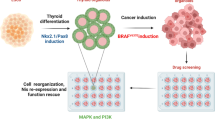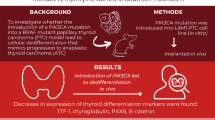Abstract
Purpose
Transforming growth factor-β (TGFβ) has pleiotropic actions, including both anti- and pro-tumorigenic abilities. We have previously shown no tumor development in the thyroid-specific TGFβ receptor type II knockout (Tgfβr2 KO) mice, indicating the insufficiency of defective TGFβ signal itself for thyroid cancer initiation. In the current study, we evaluated whether defective TGFβ signal accelerates BRAFV600E-mediated thyroid carcinogenesis in our mouse model, in which intrathyroidal injection of adenovirus expressing Cre under thyroglobulin (TG) promoter (Ad-TgP-Cre) into thyroid lobes of conditional BrafV600E knock-in mice (BrafCA) induces thyroid cancers 12 months later.
Methods
BrafCA/wt;Tgfbr2floxE2/floxE2 mice were generated by crossing Tgfbr2floxE2/floxE2 and BrafCA mice, and Ad-TgP-Cre was injected into the left lobes of 4–6-week-old mice. Mice were sacrificed at 6 and 12 months, and the thyroid tissues were subjected to H&E and immune-histochemistry and -fluorecence.
Results
Thyroid tumors were observed in 8 of 10 mice at 6 months and 4 of 7 mice at 12 months. These tumors were judged to be malignant by H&E staining, because of the presence of papillary growth of atypical follicular cells, intranuclear cytoplasmic inclusions and so on. Immunohistochemical analyses using thyroid cancer tissues obtained at 6 months demonstrated variable levels of TG but steady levels of Paired Box-8 expression and higher Ki67 positivity. The degree of epithelial-to-mesenchymal transition could not be evaluated because normal thyroid tissues and thyroid cancers developed in BrafCA and BrafCA/wt;Tgfbr2floxE2/floxE2 mice were all E-cadherin+/vimentin−, that is, epithelial type.
Conclusion
In a mouse model, defective TGFβ signaling pathway accelerates BRAFV600E-induced thyroid cancer development, which is occasionally accompanied by reduced TG expression implying dedifferentiation. The former finding is consistent with anti-tumorigenic ability of TGFβ in early tumorigenic process, but the latter is contradictory to generally accepted concept for TGFβ-induction of dedifferentiation.




Similar content being viewed by others
References
R. Vigneri, P. Malandrino, P. Vigneri, The changing epidemiology of thyroid cancer: why is incidence increasing? Curr Opin. Oncol. 27(1), 1–7 (2015). https://doi.org/10.1097/cco.0000000000000148
The Cancer Genome Atlas Research Network., Integrated genomic characterization of papillary thyroid carcinoma. Cell 159(3), 676–690 (2014). https://doi.org/10.1016/j.cell.2014.09.050
M.A. Pisarev, L. Thomasz, G.J. Juvenal, Role of transforming growth factor beta in the regulation of thyroid function and growth. Thyroid 19(8), 881–892 (2009). https://doi.org/10.1089/thy.2007.0303
M. Taton, F. Lamy, P.P. Roger, J.E. Dumont, General inhibition by transforming growth factor beta 1 of thyrotropin and cAMP responses in human thyroid cells in primary culture. Mol. Cell. Endocrinol. 95(1-2), 13–21 (1993)
C. Carneiro, C.V. Alvarez, J. Zalvide, A. Vidal, F. Dominguez, TGF-beta1 actions on FRTL-5 cells provide a model for the physiological regulation of thyroid growth. Oncogene 16(11), 1455–1465 (1998). https://doi.org/10.1038/sj.onc.1201662
F. Depoortere, I. Pirson, J. Bartek, J.E. Dumont, P.P. Roger, Transforming growth factor beta(1) selectively inhibits the cyclic AMP-dependent proliferation of primary thyroid epithelial cells by preventing the association of cyclin D3-cdk4 with nuclear p27(kip1). Mol. Biol. Cell 11(3), 1061–1076 (2000). https://doi.org/10.1091/mbc.11.3.1061
A. Franzen, E. Piek, B. Westermark, P. ten Dijke, N.E. Heldin, Expression of transforming growth factor-beta1, activin A, and their receptors in thyroid follicle cells: negative regulation of thyrocyte growth and function. Endocrinology 140(9), 4300–4310 (1999). https://doi.org/10.1210/endo.140.9.6961
W. Sun, Y. Xu, C. Zhao, F. Hao, D. Chen, J. Guan, K. Zhang, Targeting TGF-beta1 suppresses survival of and invasion by anaplastic thyroid carcinoma cells. Am. J. Transl. Res. 9(3), 1418–1425 (2017)
Y. Li, D. Chen, F.Y. Hao, K.J. Zhang, Targeting TGF-beta1 and AKT signal on growth and metastasis of anaplastic thyroid cancer cell in vivo. Eur. Rev. Med Pharmacol. Sci. 20(12), 2581–2587 (2016)
Q. Yin, S. Liu, A. Dong, X. Mi, F. Hao, K. Zhang, Targeting transforming growth factor-beta1 (TGF-beta1) inhibits tumorigenesis of anaplastic thyroid carcinoma cells through ERK1/2-NFkappakB-PUMA signaling. Med Sci. Monit. 22, 2267–2277 (2016)
K. Zhang, X. Liu, F. Hao, A. Dong, D. Chen, Targeting TGF-beta1 inhibits invasion of anaplastic thyroid carcinoma cell through SMAD2-dependent S100A4-MMP-2/9 signalling. Am. J. Transl. Res. 8(5), 2196–2209 (2016)
M. Shimamura, M. Nakahara, T. Kurashige, K. Yasui, M. Nakashima, Y. Nagayama, Disruption of transforming growth factor-beta signaling in thyroid follicular epithelial cells or intrathyroidal fibroblasts does not promote thyroid carcinogenesis. Endocr. J. 61(3), 297–302 (2014)
M. Shimamura, N. Shibusawa, T. Kurashige, Z. Mussazhanova, H. Matsuzaki, M. Nakashima, M. Yamada, Y. Nagayama, Mouse models of sporadic thyroid cancer derived from BRAFV600E alone or in combination with PTEN haploinsufficiency under physiologic TSH levels. PLoS ONE 13(8), e0201365 (2018). https://doi.org/10.1371/journal.pone.0201365
N.A. Bhowmick, A. Chytil, D. Plieth, A.E. Gorska, N. Dumont, S. Shappell, M.K. Washington, E.G. Neilson, H.L. Moses, TGF-beta signaling in fibroblasts modulates the oncogenic potential of adjacent epithelia. Science 303(5659), 848–851 (2004). https://doi.org/10.1126/science.1090922. [doi] 03/5659/848
D. Dankort, E. Filenova, M. Collado, M. Serrano, K. Jones, M. McMahon, A new mouse model to explore the initiation, progression, and therapy of BRAFV600E-induced lung tumors. Gene Dev. 21(4), 379–384 (2007). https://doi.org/10.1101/gad.1516407
M. Shimamura, M. Nakahara, F. Orim, T. Kurashige, N. Mitsutake, M. Nakashima, S. Kondo, M. Yamada, R. Taguchi, S. Kimura, Y. Nagayama, Postnatal expression of BRAFV600E does not induce thyroid cancer in mouse models of thyroid papillary carcinoma. Endocrinology 154(11), 4423–4430 (2013). https://doi.org/10.1210/en.2013-1174
X.J. Wang, D.A. Greenhalgh, J.R. Bickenbach, A. Jiang, D.S. Bundman, T. Krieg, R. Derynck, D.R. Roop, Expression of a dominant-negative type II transforming growth factor beta (TGF-beta) receptor in the epidermis of transgenic mice blocks TGF-beta-mediated growth inhibition. Proc. Natl. Acad. Sci. USA 94(6), 2386–2391 (1997)
E.P. Bottinger, J.L. Jakubczak, I.S. Roberts, M. Mumy, P. Hemmati, K. Bagnall, G. Merlino, L.M. Wakefield, Expression of a dominant-negative mutant TGF-beta type II receptor in transgenic mice reveals essential roles for TGF-beta in regulation of growth and differentiation in the exocrine pancreas. EMBO J. 16(10), 2621–2633 (1997). https://doi.org/10.1093/emboj/16.10.2621
H. Ijichi, A. Chytil, A.E. Gorska, M.E. Aakre, Y. Fujitani, S. Fujitani, C.V. Wright, H.L. Moses, Aggressive pancreatic ductal adenocarcinoma in mice caused by pancreas-specific blockade of transforming growth factor-beta signaling in cooperation with active Kras expression. Gene Dev. 20(22), 3147–3160 (2006). https://doi.org/10.1101/gad.1475506
N.M. Munoz, M. Upton, A. Rojas, M.K. Washington, L. Lin, A. Chytil, E.G. Sozmen, B.B. Madison, A. Pozzi, R.T. Moon, H.L. Moses, W.M. Grady, Transforming growth factor beta receptor type II inactivation induces the malignant transformation of intestinal neoplasms initiated by Apc mutation. Cancer Res. 66(20), 9837–9844 (2006). https://doi.org/10.1158/0008-5472.Can-06-0890
Y. Gao, P. Lin, J.P. Lydon, Q. Li, Conditional abrogation of transforming growth factor-beta receptor 1 in PTEN-inactivated endometrium promotes endometrial cancer progression in mice. J. Pathol. 243(1), 89–99 (2017). https://doi.org/10.1002/path.4930
E. Forrester, A. Chytil, B. Bierie, M. Aakre, A.E. Gorska, A.R. Sharif-Afshar, W.J. Muller, H.L. Moses, Effect of conditional knockout of the type II TGF-beta receptor gene in mammary epithelia on mammary gland development and polyomavirus middle T antigen induced tumor formation and metastasis. Cancer Res. 65(6), 2296–2302 (2005). https://doi.org/10.1158/0008-5472.Can-04-3272
P. Trobridge, S. Knoblaugh, M.K. Washington, N.M. Munoz, K.D. Tsuchiya, A. Rojas, X. Song, C.M. Ulrich, T. Sasazuki, S. Shirasawa, W.M. Grady, TGF-beta receptor inactivation and mutant Kras induce intestinal neoplasms in mice via a beta-catenin-independent pathway. Gastroenterology 136(5), 1680–1688.e1687 (2009). https://doi.org/10.1053/j.gastro.2009.01.066
Y. Katsuno, S. Lamouille, R. Derynck, TGF-beta signaling and epithelial-mesenchymal transition in cancer progression. Curr. Opin. Oncol. 25(1), 76–84 (2013). https://doi.org/10.1097/CCO.0b013e32835b6371
V. Vasko, A.V. Espinosa, W. Scouten, H. He, H. Auer, S. Liyanarachchi, A. Larin, V. Savchenko, G.L. Francis, A. de la Chapelle, M. Saji, M.D. Ringel, Gene expression and functional evidence of epithelial-to-mesenchymal transition in papillary thyroid carcinoma invasion. Proc. Natl. Acad. Sci. USA 104(8), 2803–2808 (2007). https://doi.org/10.1073/pnas.0610733104
G. Riesco-Eizaguirre, I. Rodriguez, A. De la Vieja, E. Costamagna, N. Carrasco, M. Nistal, P. Santisteban, The BRAFV600E oncogene induces transforming growth factor beta secretion leading to sodium iodide symporter repression and increased malignancy in thyroid cancer. Cancer Res. 69(21), 8317–8325 (2009). https://doi.org/10.1158/0008-5472.Can-09-1248
R.G. Hardy, C. Vicente-Duenas, I. Gonzalez-Herrero, C. Anderson, T. Flores, S. Hughes, C. Tselepis, J.A. Ross, I. Sanchez-Garcia, Snail family transcription factors are implicated in thyroid carcinogenesis. Am. J. Pathol. 171(3), 1037–1046 (2007). https://doi.org/10.2353/ajpath.2007.061211
J.A. Knauf, M.A. Sartor, M. Medvedovic, E. Lundsmith, M. Ryder, M. Salzano, Y.E. Nikiforov, T.J. Giordano, R.A. Ghossein, J.A. Fagin, Progression of BRAF-induced thyroid cancer is associated with epithelial-mesenchymal transition requiring concomitant MAP kinase and TGFbeta signaling. Oncogene 30(28), 3153–3162 (2011). https://doi.org/10.1038/onc.2011.44
G. Riesco-Eizaguirre, P. Santisteban, ENDOCRINE TUMOURS: Advances in the molecular pathogenesis of thyroid cancer: lessons from the cancer genome. Eur. J. Endocrinol. 175(5), R203–R217 (2016). https://doi.org/10.1530/eje-16-0202
C. Durante, E. Puxeddu, E. Ferretti, R. Morisi, S. Moretti, R. Bruno, F. Barbi, N. Avenia, A. Scipioni, A. Verrienti, E. Tosi, A. Cavaliere, A. Gulino, S. Filetti, D. Russo, BRAF mutations in papillary thyroid carcinomas inhibit genes involved in iodine metabolism. J. Clin. Endocrinol. Metab. 92(7), 2840–2843 (2007). https://doi.org/10.1210/jc.2006-2707
A. Tanaka, M. Matsuse, V. Saenko, T. Nakao, K. Yamanouchi, C. Sakimura, H. Yano, E. Nishihara, M. Hirokawa, K. Suzuki, A. Miyauchi, S. Eguchi, K.I. Yoshiura, S. Yamashita, T. Nagayasu, N. Mitsutake, TERT mRNA expression as a novel prognostic marker in papillary thyroid carcinomas. Thyroid 29(8), 1105–1114 (2019). https://doi.org/10.1089/thy.2018.0695
M. Nakano, Y. Kikushige, K. Miyawaki, Y. Kunisaki, S. Mizuno, K. Takenaka, S. Tamura, Y. Okumura, M. Ito, H. Ariyama, H. Kusaba, M. Nakamura, T. Maeda, E. Baba, K. Akashi, Dedifferentiation process driven by TGF-beta signaling enhances stem cell properties in human colorectal cancer. Oncogene 38(6), 780–793 (2019). https://doi.org/10.1038/s41388-018-0480-0
P. Cammareri, D.F. Vincent, M.C. Hodder, R.A. Ridgway, C. Murgia, M. Nobis, A.D. Campbell, J. Varga, D.J. Huels, C. Subramani, K.L.H. Prescott, C. Nixon, A. Hedley, S.T. Barry, F.R. Greten, G.J. Inman, O.J. Sansom, TGFbeta pathway limits dedifferentiation following WNT and MAPK pathway activation to suppress intestinal tumourigenesis. Cell Death Differ. 24(10), 1681–1693 (2017). https://doi.org/10.1038/cdd.2017.92
D. Lazzereschi, F. Nardi, A. Turco, L. Ottini, C. D’Amico, R. Mariani-Costantini, A. Gulino, A. Coppa, A complex pattern of mutations and abnormal splicing of Smad4 is present in thyroid tumours. Oncogene 24(34), 5344–5354 (2005). https://doi.org/10.1038/sj.onc.1208603
C.S. Fuziwara, K.C. Saito, E.T. Kimura, Interplay of TGFbeta signaling and microRNA in thyroid cell loss of differentiation and cancer progression. Arch. Endocrinol. Metab. 63(5), 536–544 (2019). https://doi.org/10.20945/2359-3997000000172
S.E. Matsuo, A.P. Fiore, S.M. Siguematu, K.N. Ebina, C.U. Friguglietti, M.C. Ferro, M.A. Kulcsar, E.T. Kimura, Expression of SMAD proteins, TGF-beta/activin signaling mediators, in human thyroid tissues. Arq. Bras. Endocrinol. Metab. 54(4), 406–412 (2010). https://doi.org/10.1590/s0004-27302010000400010
S.B. Bravo, S. Pampin, J. Cameselle-Teijeiro, C. Carneiro, F. Dominguez, F. Barreiro, C.V. Alvarez, TGF-beta-induced apoptosis in human thyrocytes is mediated by p27kip1 reduction and is overridden in neoplastic thyrocytes by NF-kappaB activation. Oncogene 22(49), 7819–7830 (2003). https://doi.org/10.1038/sj.onc.1207029
Author information
Authors and Affiliations
Corresponding author
Ethics declarations
Conflict of interest
The authors declare that they have no conflict of interest.
Ethics approval
All applicable international, national, and/or institutional guidelines for the care and use of animals were followed.
Additional information
Publisher's note: Springer Nature remains neutral with regard to jurisdictional claims in published maps and institutional affiliations.
Rights and permissions
About this article
Cite this article
Shimamura, M., Kurashige, T., Kuatov, R. et al. Acceleration of BRAFV600E-induced thyroid carcinogenesis by TGFβ signal deficiency in mice. Endocrine 69, 571–577 (2020). https://doi.org/10.1007/s12020-020-02298-1
Received:
Accepted:
Published:
Issue Date:
DOI: https://doi.org/10.1007/s12020-020-02298-1




